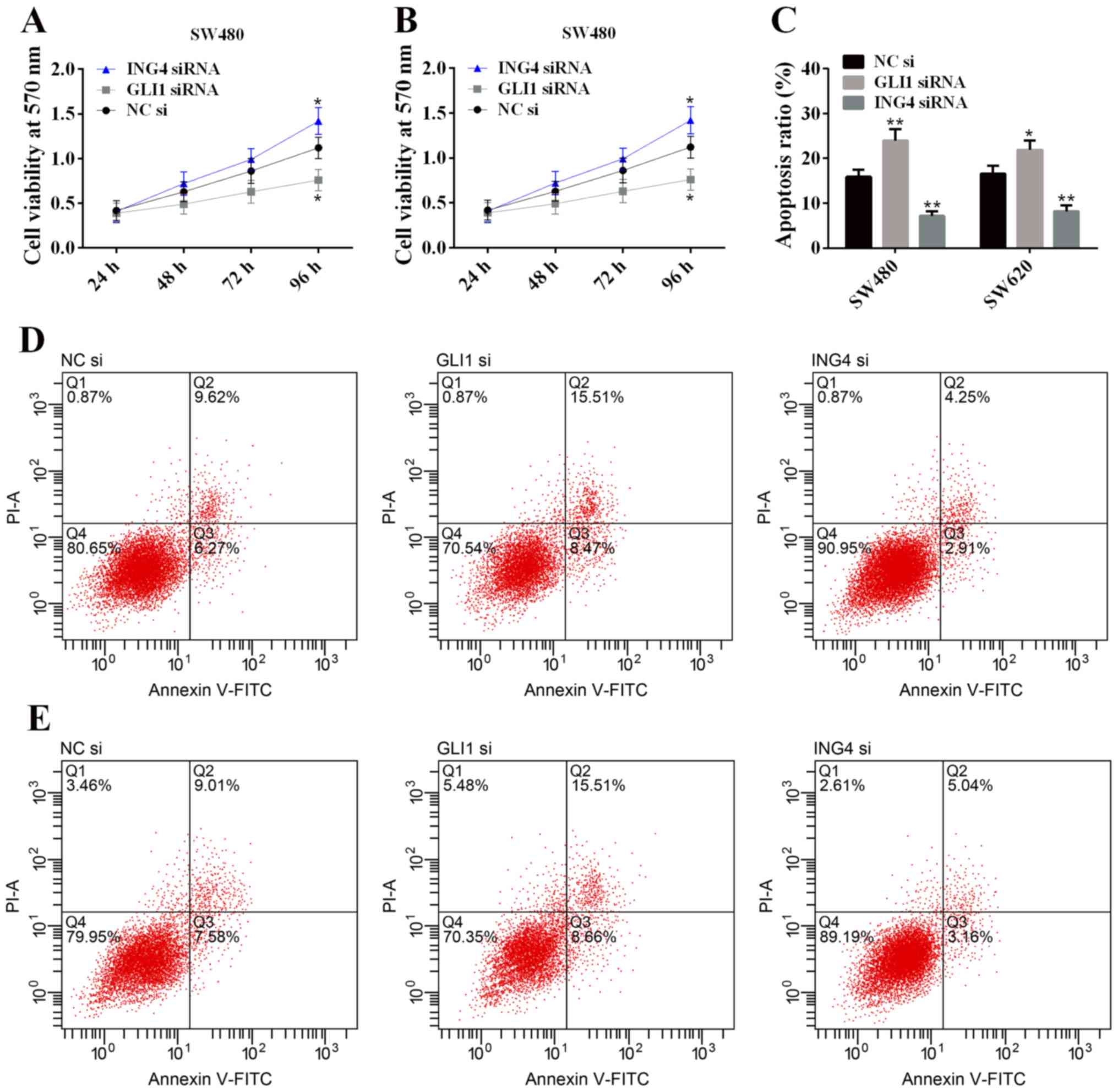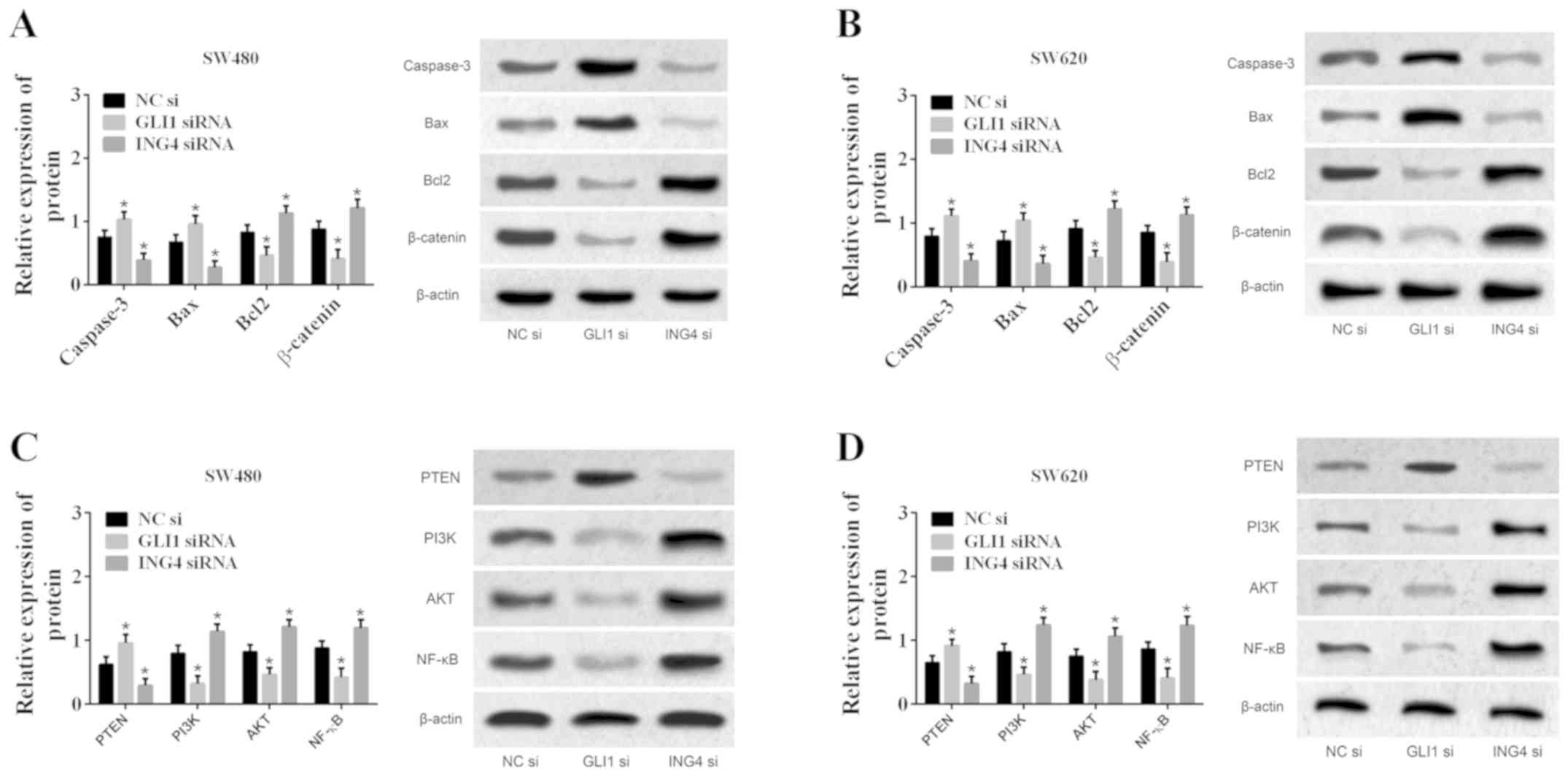|
1
|
Vasaikar S, Huang C, Wang X, Petyuk VA,
Savage SR, Wen B, Dou Y, Zhang Y, Shi Z, Arshad OA, et al Clinical
proteomic tumor analysis consortium, : Proteogenomic analysis of
human colon cancer reveals new therapeutic opportunities. Cell.
177:1035–1049.e19. 2019. View Article : Google Scholar : PubMed/NCBI
|
|
2
|
Zhang L, Cao F, Zhang G, Shi L, Chen S,
Zhang Z, Zhi W and Ma T: Trends in and predictions of colorectal
cancer incidence and mortality in China from 1990 to 2025. Front
Oncol. 9:982019. View Article : Google Scholar : PubMed/NCBI
|
|
3
|
Laish I, Mizrahi J, Naftali T and Konikoff
FM: Diabetes mellitus and age are risk factors of Interval colon
cancer: A case-control Study. Dig Dis. 37:291–296. 2019. View Article : Google Scholar : PubMed/NCBI
|
|
4
|
Haggar FA and Boushey RP: Colorectal
cancer epidemiology: Incidence, mortality, survival, and risk
factors. Clin Colon Rectal Surg. 22:191–197. 2009. View Article : Google Scholar : PubMed/NCBI
|
|
5
|
Zhu RT, Gutkind JS, Johnson DE and Grandis
JR: PIK3CA mutations in colorectal and breast cancer: Impact on
oncogenesis and response to nonsteroidal anti-inflammatory drugs.
In: Targeting Cell Survival Pathways to Enhance Response to
Chemotherapy. Johnson DE (ed). Academic Press. (Cambridge, MA).
123–144. 2019.
|
|
6
|
Oh M, McBride A, Yun S, Bhattacharjee S,
Slack M, Martin JR, Jeter J and Abraham I: BRCA1 and BRCA2 gene
mutations and colorectal cancer risk: Systematic review and
meta-analysis. J Natl Cancer Inst. 110:1178–1189. 2018. View Article : Google Scholar : PubMed/NCBI
|
|
7
|
Sabry D, El-Deek SEM, Maher M, El-Baz MAH,
El-Bader HM, Amer E, Hassan EA, Fathy W and El-Deek HEM: Role of
miRNA-210, miRNA-21 and miRNA-126 as diagnostic biomarkers in
colorectal carcinoma: Impact of HIF-1α-VEGF signaling pathway. Mol
Cell Biochem. 454:177–189. 2019. View Article : Google Scholar : PubMed/NCBI
|
|
8
|
Wen YA, Xiong X, Scott T, Li AT, Wang C,
Weiss HL, Tan L, Bradford E, Fan TWM, Chandel NS, et al: The
mitochondrial retrograde signaling regulates Wnt signaling to
promote tumorigenesis in colon cancer. Cell Death Differ.
26:1955–1969. 2019. View Article : Google Scholar : PubMed/NCBI
|
|
9
|
Ostermann AL, Wunderlich CM, Schneiders L,
Vogt MC, Woeste MA, Belgardt BF, Niessen CM, Martiny B, Schauss AC,
Frommolt P, et al: Intestinal insulin/IGF1 signalling through FoxO1
regulates epithelial integrity and susceptibility to colon cancer.
Nat Metab. 1:371–389. 2019. View Article : Google Scholar
|
|
10
|
Du Y, Cheng Y and Su G: The essential role
of tumor suppressor gene ING4 in various human cancers and
non-neoplastic disorders. Biosci Rep. 39:392019. View Article : Google Scholar
|
|
11
|
Ma Y, Cheng X, Wang F, Pan J, Liu J, Chen
H, Wang Y and Cai L: ING4 inhibits proliferation and induces
apoptosis in human melanoma A375 cells via the Fas/caspase-8
apoptosis pathway. Dermatology. 232:265–272. 2016. View Article : Google Scholar : PubMed/NCBI
|
|
12
|
Qian F, Hu Q, Tian Y, Wu J, Li D, Tao M,
Qin L, Shen B and Xie Y: ING4 suppresses hepatocellular carcinoma
via a NF-κB/miR-155/FOXO3a signaling axis. Int J Biol Sci.
15:369–385. 2019. View Article : Google Scholar : PubMed/NCBI
|
|
13
|
Cao L, Chen S, Zhang C, Chen C, Lu N,
Jiang Y, Cai Y, Yin Y and Xu J: ING4 enhances paclitaxel's effect
on colorectal cancer growth in vitro and in vivo. Int J Clin Exp
Pathol. 8:2919–2927. 2015.PubMed/NCBI
|
|
14
|
Chen Y, Huang Y, Hou P, Zhang Z, Zhang Y,
Wang W, Sun G, Xu L, Zhou J, Bai J, et al: ING4 suppresses tumor
angiogenesis and functions as a prognostic marker in human
colorectal cancer. Oncotarget. 7:79017–79031. 2016. View Article : Google Scholar : PubMed/NCBI
|
|
15
|
Qu H, Yin H, Yan S, Tao M, Xie Y and Chen
W: Inhibitor of growth 4 suppresses colorectal cancer growth and
invasion by inducing G1 arrest, inhibiting tumor angiogenesis and
reversing epithelial-mesenchymal transition. Oncol Rep.
35:2927–2935. 2016. View Article : Google Scholar : PubMed/NCBI
|
|
16
|
Riaz SK, Ke Y, Wang F, Kayani MA and Malik
MFA: Influence of SHH/GLI1 axis on EMT mediated migration and
invasion of breast cancer cells. Sci Rep. 9:66202019. View Article : Google Scholar : PubMed/NCBI
|
|
17
|
Yoon JW, Lamm M, Iannaccone P and
Walterhouse D: GLI1 contributes to proliferation, survival and
drug-resistance of Ewing sarcoma (EWS) cell. AACR. 36612019.
|
|
18
|
Yang Z, Zhang C, Qi W, Cui Y and Xuan Y:
GLI1 promotes cancer stemness through intracellular signaling
pathway PI3K/Akt/NFκB in colorectal adenocarcinoma. Exp Cell Res.
373:145–154. 2018. View Article : Google Scholar : PubMed/NCBI
|
|
19
|
Wang X, Yao Y and Zhu X: The influence of
aberrant expression of GLI1/p-S6K on colorectal cancer. Biochem
Biophys Res Commun. 503:3198–3204. 2018. View Article : Google Scholar : PubMed/NCBI
|
|
20
|
Mulder K, Scarfe A, Chua N and Spratlin J:
The role of bevacizumab in colorectal cancer: Understanding its
benefits and limitations. Expert Opin Biol Ther. 11:405–413. 2011.
View Article : Google Scholar : PubMed/NCBI
|
|
21
|
Georgescu MM: PTEN tumor suppressor
network in PI3K-Akt pathway control. Genes Cancer. 1:1170–1177.
2010. View Article : Google Scholar : PubMed/NCBI
|
|
22
|
Watson M, Berger P, Frank S, Winn M and
Miranti C: CREB1 and ATF1 differentially regulate terminal prostate
luminal differentiation by controlling the timing of ING4
expression, while CREB1 prevents ING4 expression upon PTEN loss in
prostate cancer. Cancer Res. 78 (16 Suppl):Abstract B031. 2018.
|
|
23
|
Rakshit N, Yang S, Zhou W, Xu Y, Deng C,
Yang J, Yu H and Wei W: Adenovirus-mediated co-expression of ING4
and PTEN cooperatively enhances their antitumor activity in human
hepatocellular carcinoma cells. Acta Biochim Biophys Sin
(Shanghai). 48:704–713. 2016. View Article : Google Scholar : PubMed/NCBI
|
|
24
|
Wang Y, Yang J, Sheng W, Xie Y and Liu J:
Adenovirus-mediated ING4/PTEN double tumor suppressor gene
co-transfer modified by RGD enhances antitumor activity in human
nasopharyngeal carcinoma cells. Int J Oncol. 46:1295–1303. 2015.
View Article : Google Scholar : PubMed/NCBI
|
|
25
|
Barlak N, Capik O, Sanli F, Kilic A,
Aytatli A, Yazici A, Ortucu S, Ittmann M and Karatas OF: ING5
inhibits cancer aggressiveness by inhibiting Akt and activating p53
in prostate cancer. Cell Biol Int cbin.11227. 2019.
|




















